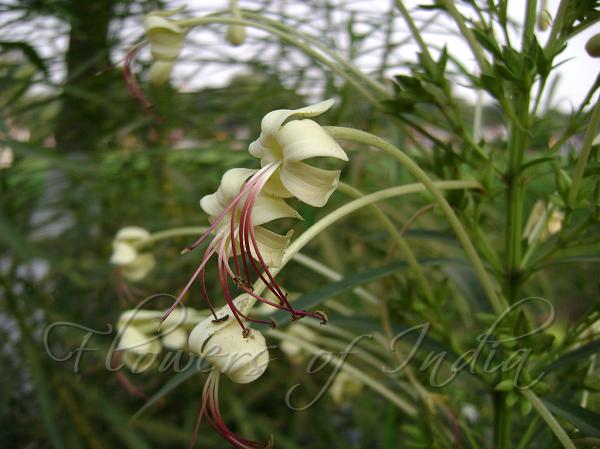|
| Tubeflower |
|

|

| File size | 1919583 |
| Original date | 10/18/07 3:54 PM |
| Resolution | 2592 x 1944 |
| Flash | Flash did not fire, auto |
| Focal length | 5.8mm |
| Exposure time | 1/400s |
| Aperture | 2.8 |
| Focus Distance | |
| Metering Mode | Multi-segment |
| Camera make | SONY |
| Camera model | DSC-S650 |
| Sensor type |
|
|
|
|
Photo: |
Botanical name: Clerodendrum indicum Family: Verbenaceae (Verbena family)
Synonyms: Clerodendrum siphonanthus
Synonyms: Clerodendrum siphonanthus
Tubeflower is a semiwoody shrub or returning perennial, 6-9 ft tall and
only slightly, if at all, branched. Leaves are whorled, stalkless, 3-5 in
each whorl, narrowly lanceshaped, 10-20 cm long, 1-2.5 cm broad, entire,
pointed. Cymes whorledly arranged to form a at branch-ends, 20-25 cm long
panicle. Flowers are white, about 1.5 cm across; bracts 5-10 mm long,
reddish when young, linear to linear-lanceshaped; flower-stalks up to
1.5 cm long. Sepals are 6-7 mm long, ovate-lanceshaped. Flower-tube
is very long, 8-10 cm, hairless; petals ovate-oblong, 1.0-1.2 cm long,
blunt. Drupe is about 1 cm in diameter, bluish-black, enclosed by enlarged
red colored sepal-cup. Tubeflower is found in India, Burma, Malaysia,
Indochina and Java. Flowering: July-October.
Medicinal uses: The bark of the root contains phenolic glycoside
and seponin as active ingredient. Seponin is very helpful as an
antihistamine agent thus is very much effective in preventing the bodies or
over active reaction of the body towards any external agent entering the
body. According to Ayurveda, it is a good anti-inflammatory agent and also
helps in healing of wounds. It improves circulation of blood in the body.
Bhangri is also helpful in improving the digestive activities of the body.
It acts on respiratory system thus expelling out the excessive mucus in the
tract relieving from cough, cold and asthmatic symptoms. It opens the body
pores and increases the sweating in the body.
The bark of the root contains phenolic glycoside
and seponin as active ingredient. Seponin is very helpful as an
antihistamine agent thus is very much effective in preventing the bodies or
over active reaction of the body towards any external agent entering the
body. According to Ayurveda, it is a good anti-inflammatory agent and also
helps in healing of wounds. It improves circulation of blood in the body.
Bhangri is also helpful in improving the digestive activities of the body.
It acts on respiratory system thus expelling out the excessive mucus in the
tract relieving from cough, cold and asthmatic symptoms. It opens the body
pores and increases the sweating in the body.
Medicinal uses:
 The bark of the root contains phenolic glycoside
and seponin as active ingredient. Seponin is very helpful as an
antihistamine agent thus is very much effective in preventing the bodies or
over active reaction of the body towards any external agent entering the
body. According to Ayurveda, it is a good anti-inflammatory agent and also
helps in healing of wounds. It improves circulation of blood in the body.
Bhangri is also helpful in improving the digestive activities of the body.
It acts on respiratory system thus expelling out the excessive mucus in the
tract relieving from cough, cold and asthmatic symptoms. It opens the body
pores and increases the sweating in the body.
The bark of the root contains phenolic glycoside
and seponin as active ingredient. Seponin is very helpful as an
antihistamine agent thus is very much effective in preventing the bodies or
over active reaction of the body towards any external agent entering the
body. According to Ayurveda, it is a good anti-inflammatory agent and also
helps in healing of wounds. It improves circulation of blood in the body.
Bhangri is also helpful in improving the digestive activities of the body.
It acts on respiratory system thus expelling out the excessive mucus in the
tract relieving from cough, cold and asthmatic symptoms. It opens the body
pores and increases the sweating in the body.| Identification credit: Tabish | Photographed at Taj Mahal, Agra & Kathua, Jammu. |
• Is this flower misidentified? If yes,